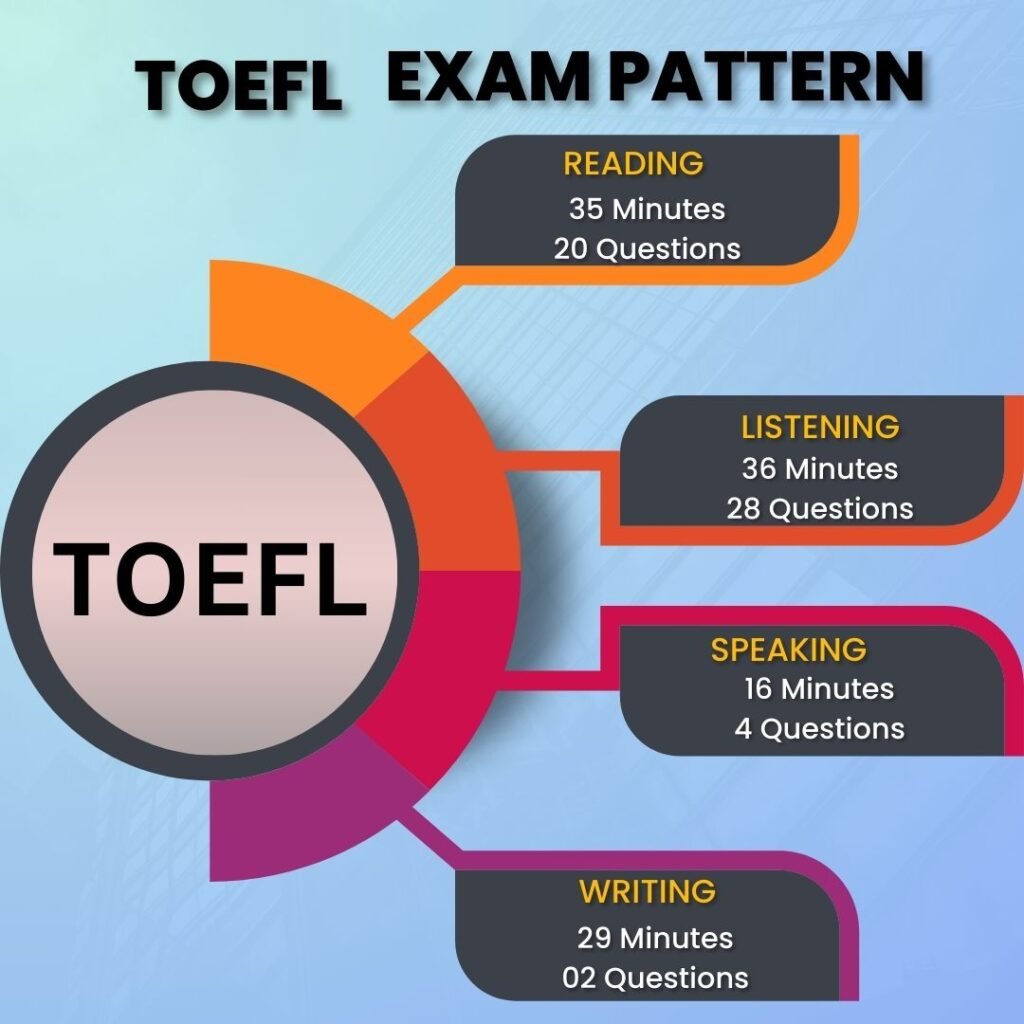
Telangana.India
Send an e-mail
Call Us Now
TOEFL, which stands for the Test of English as a Foreign Language, serves as an English proficiency assessment for students aspiring to pursue studies in English-speaking countries. Administered by ETS (Educational Testing Services), TOEFL evaluates candidates on all four essential academic English skills: Reading, Listening, Speaking, and Writing.
The TOEFL exam is available in two formats: the computer-delivered method known as TOEFL iBT (internet-based test) and the traditional paper-based test. In response to evolving circumstances, ETS has introduced the TOEFL Home Edition, allowing students to take the exam safely from the comfort of their homes.
TOEFL scores find wide acceptance among American and Canadian universities, as well as various educational institutions around the world, making it a preferred choice for students aiming for global education opportunities. The flexibility of test formats, including the at-home option, adds convenience for test-takers in their pursuit of academic excellence.
TOEFL exam is essential for students seeking higher education in overseas universities, as it opens up scholarship opportunities and simplifies the visa application process. It is particularly popular among Indian students, with over 11,000 institutions worldwide, including USA, UK, and New Zealand, accepting TOEFL scores for admission.
The TOEFL test evaluates proficiency in reading, writing, speaking, and listening, serving as a key indicator of a student’s readiness for an English-speaking academic environment. It helps universities assess a candidate’s English language skills for undergraduate and graduate programs.
Achieving a specific TOEFL score can enhance scholarship prospects and is sometimes required for immigration and professional licensing in certain countries and professions. Additionally, the test provides valuable insights into a student’s strengths and weaknesses in academic English, aiding in self-evaluation and improvement.

TOEFL iBT Format and Structure:
The TOEFL iBT is the most widely accepted format by universities worldwide, consisting of a computer-based test that evaluates all four English skills. It includes Reading (3 passages with 10 questions each, 60 minutes), Listening (6 lectures/conversations with 6 questions each, 60 minutes), Speaking (4 tasks: 2 independent and 2 integrated, 20 minutes), and Writing (2 essays: 1 integrated and 1 independent, 60 minutes).
Scoring and Duration:
TOEFL iBT scores range from 0 to 120, with a total testing time of approximately 3 hours. This comprehensive assessment provides a clear indication of a candidate’s proficiency in academic English, essential for success in English-speaking academic environments.
TOEFL PBT Format and Structure:
The TOEFL Paper-Based Test (PBT) is offered in limited locations and uses paper booklets for all sections. While its structure is similar to the iBT, there are slight variations in question types and numbers. The total testing time is approximately 3 hours.
Scoring and Acceptance:
Scores for the TOEFL PBT range from 200 to 580, but this format is less widely accepted than the iBT, making it a less common choice for students seeking international education opportunities.
TOEFL Home Edition Format and Content:
The TOEFL Home Edition maintains the same format and content as the iBT, ensuring that students experience a familiar testing structure. This option allows candidates to take the exam from the comfort of their own homes while utilizing secure online proctoring to maintain the integrity of the testing process.
Technical Requirements and Testing Environment:
To successfully take the TOEFL Home Edition, candidates must meet specific technical requirements, including a reliable internet connection, a compatible computer, and appropriate software. Additionally, a secure testing environment is necessary, free from distractions and unauthorized materials, to ensure a fair and valid assessment of English proficiency.
The TOEFL exam is open to anyone, regardless of nationality, education level, or age, with no restrictions on who can register. Candidates must complete their registration through ETS (Educational Testing Service).
This depends on the requirements of your desired university or institution. Generally, scores above 90 are considered competitive for graduate programs, while scores above 100 are often expected for top universities.
The current registration fee for the TOEFL iBT is $215, with variations for other formats and locations.
There are many resources available, including official ETS practice materials, online courses, and textbooks. Taking practice tests and familiarizing yourself with the test format is crucial.
Yes, you can retake the TOEFL as many times as you want. However, there is a minimum 12-day waiting period between test attempts.
Practice reading academic texts and passages under timed conditions.
Focus on academic vocabulary related to science, history, and other academic fields.
Look for keywords, transitions, and supporting details.
Listen to academic lectures and podcasts regularly.
Participate in discussions with native speakers and record yourself speaking to analyze your fluency and pronunciation
Munu International stands out as a prominent consultancy specializing in global education, committed to guiding Indian students in realizing their academic ambitions on the international front. Our resolute dedication to excellence and an enduring enthusiasm for education have established us as a reliable partner in helping students pursue their overseas study dreams.
Flat no:101, First Floor, Ameer Estate,
beside S.R. Nagar Bus stop, Ameerpet, Hyderabad-500038
Opp.Metro Pillar -1038
Copyright © 2023, All Rights Reserved By Munu International | Powered by Sky High Digitals